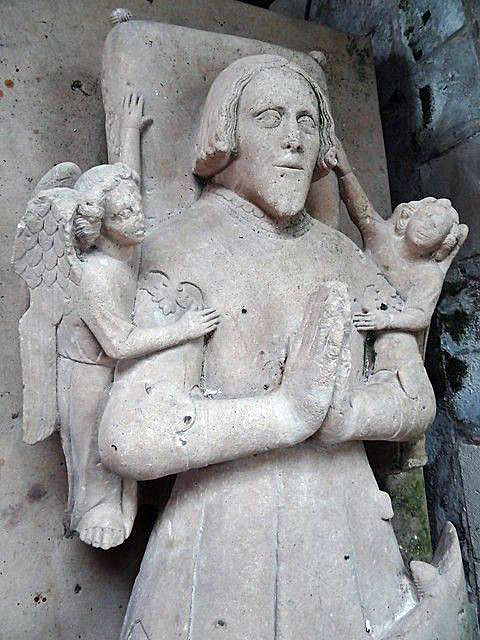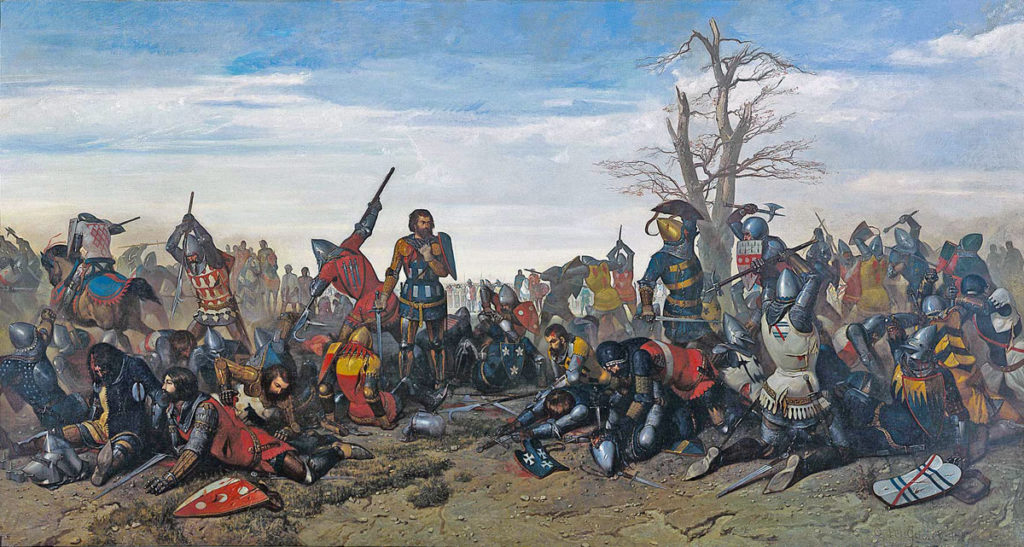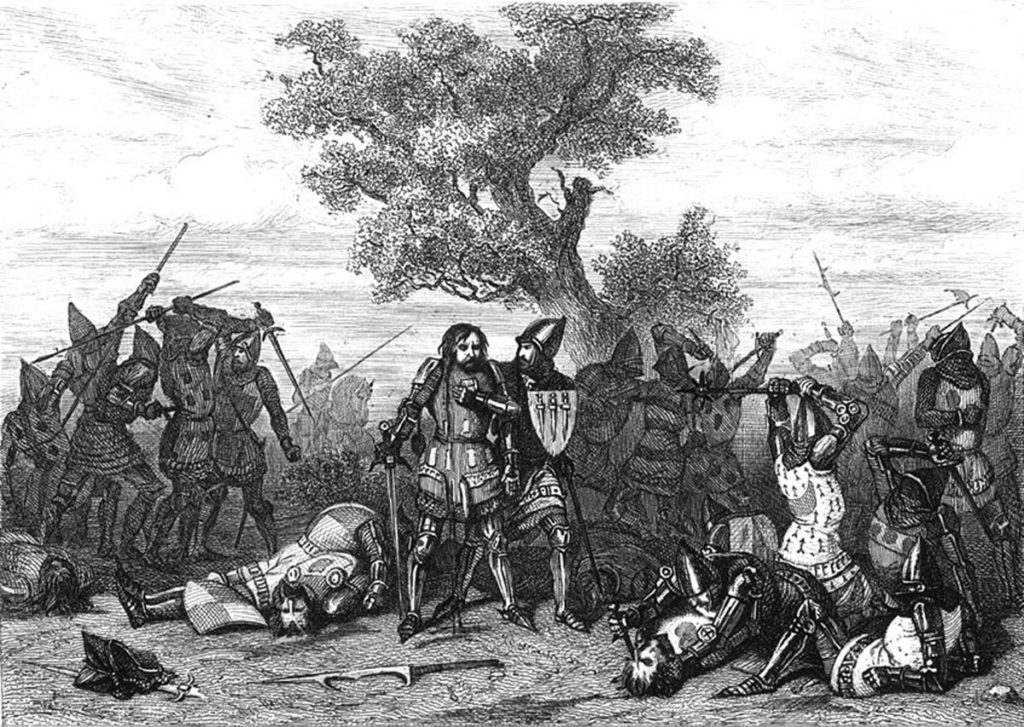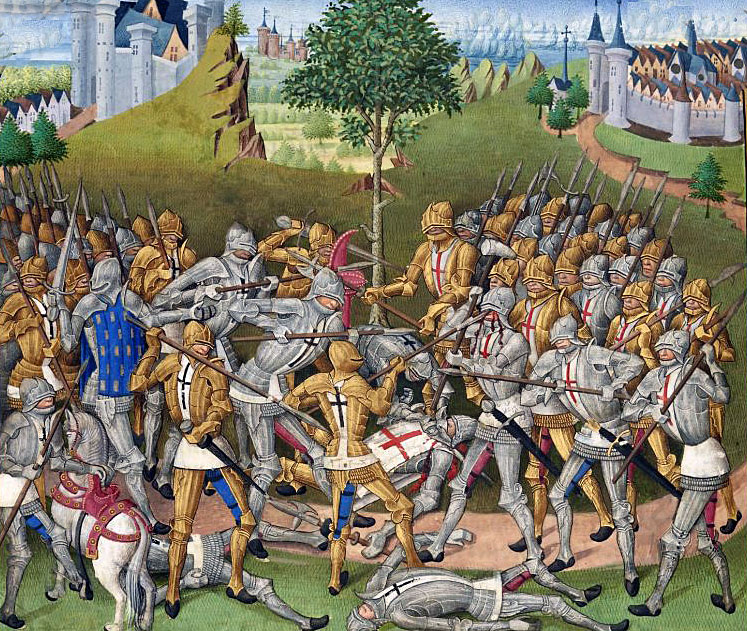The battle on 14th August 1352 in the Hundred Years War at which 89 members of the French King John II’s new order of chivalry the ‘Order of the Star’ were killed by the Anglo-Bretons
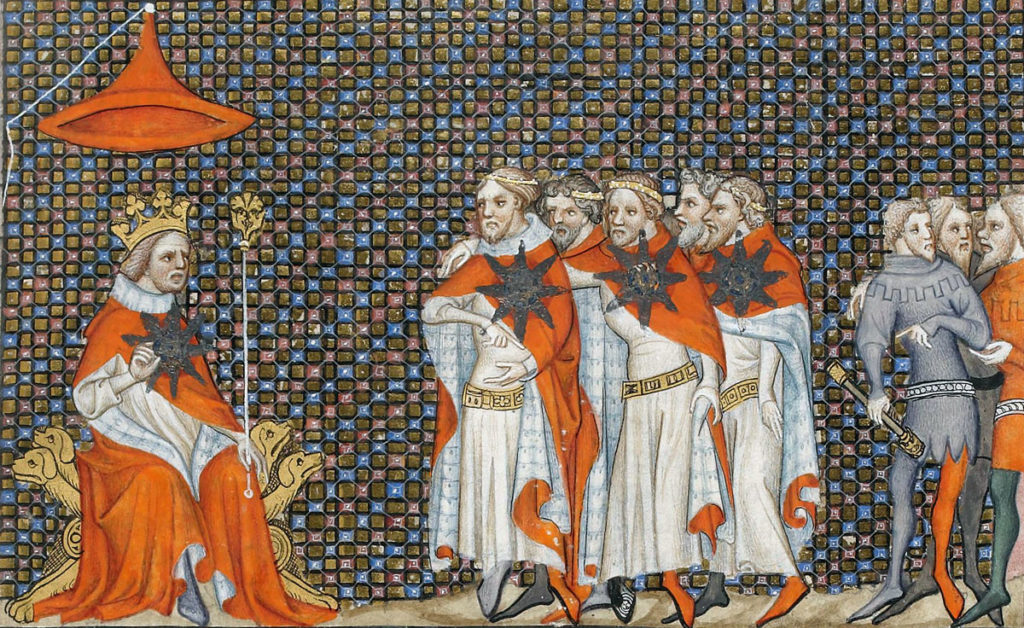
The previous battle of the Hundred Years War is the Battle of Winchelsea
The next battle of the Hundred Years War is the Battle of Poitiers
War: Hundred Years War
Date of the Battle of Mauron: 14th August 1352
Place of the Battle of Mauron: In Brittany, in north-west France, 30 miles to the south-west of the city of Rennes.
Combatants at the Battle of Mauron: An Anglo-Breton army against a Franco-Breton army.
Commanders at the Battle of Mauron: Sir William Bentley and Robert Knolles led the Anglo-Breton army.
Guy de Nesle, Marshal of France, commanded the Franco-Breton army of King John II.
John Lord of Hangest commanded the mounted Franco-Breton attack on the left wing.
Size of the armies at the Battle of Mauron: The Anglo-Breton army probably numbered around 2,000 men.
The French army may have numbered around 9,000 men.
Uniforms, arms and equipment at the Battle of Mauron: Knights increasingly wore steel plate armour with visored helmets. Their weapons were lance, shield, sword, various forms of mace or club and dagger. Many carried two-handed swords in battle. Each knight wore his coat of arms on his surcoat and shield.
The English archers carried a powerful bow, capable of many aimed shots a minute.
For hand-to-hand combat archers carried swords, daggers, hatchets and war hammers. They wore jackets and loose hose. Archers’ headgear was a skull cap either of boiled leather or wickerwork ribbed with a steel frame.
Winner of the Battle of Mauron: The Anglo-Breton army decisively defeated the Franco-Breton army.
Events leading to the Battle of Mauron:
In April 1341, John III Duke of Brittany died without male heir to succeed him.
The consequence was the outbreak of a long and bitter civil war for the dukedom between John de Montfort, the dead duke’s half-brother and his niece, Jeanne de Penthièvre, married to Charles of Blois, a senior Breton magnate.
The Breton civil war took place against the background of the Hundred Years War between England and France.
The Breton civil war simmered for some thirty years with John de Montfort and on his death his son supported by the English kings and Charles of Blois and on his death the house of Penthièvre/Blois by the French kings.
Over the years, English armies were despatched to Brittany and occupied several towns and castles in the dukedom.
After a lull in the fighting, hostilities between the parties resumed in the dukedom of Brittany in 1350.
The fight of the Thirty:
In early 1351, a French knight, Jean de Beaumanoir, commander of the garrison in the Vicomte de Rohan’s castle at Josselin, issued a challenge to the English commander of the nearby castle in the fortified town of Ploërmel, Robert Bamborough, nick-named Bramborc, for a battle between teams of knights, initially set at twenty and later increased to thirty.
The two challengers met to set the rules for the combat, which included provision for breaks for refreshments and the dressing of wounds.
The teams for this mortal combat were selected from the Franco-Breton and Anglo-Breton garrisons in Brittany and elsewhere.
The English side included the well-known captains, Sir Hugh Calveley, Sir Robert Knolles and Sir John Dagworth.
The battle was fought on 26th March 1351, mid-way between the two castles and lasted several hours.
The victors were Beaumanoir’s Franco-Breton side, which suffered six fatalities.
The English side suffered many more casualties and the rest of the English ‘team’ became prisoners of the Franco-Bretons and subject to ransome.
Most of the survivors of the fight were wounded.
The course of the battle was recorded in a well-known French poem.
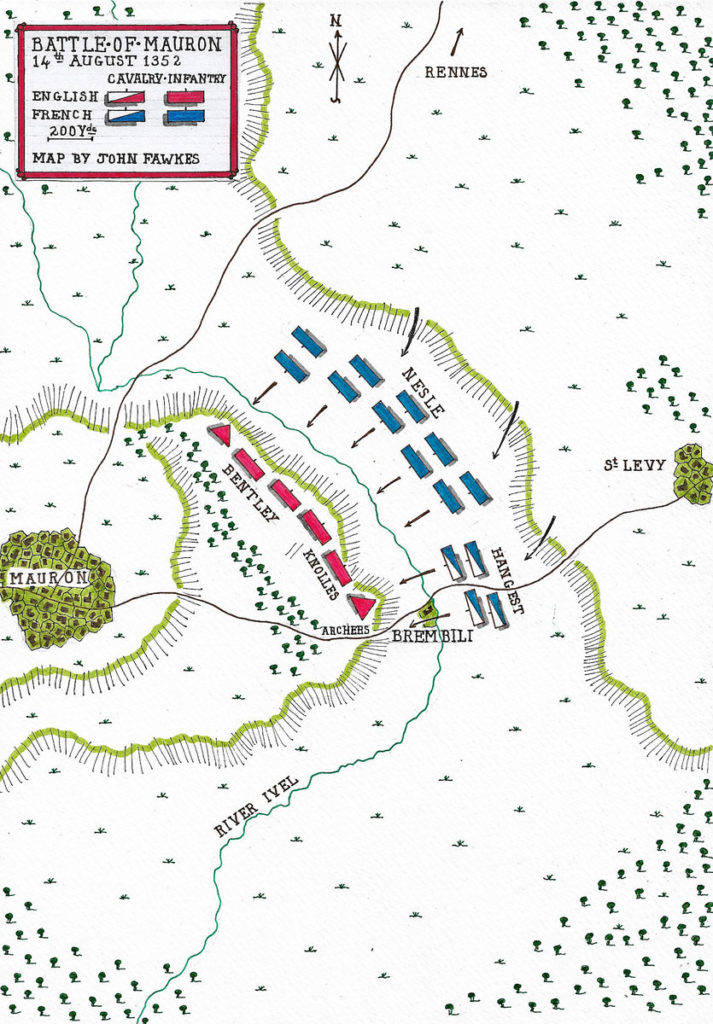
Battle of Mauron:
From the end of March 1352, the main Franco-Breton army gathered at the Breton city of Rennes, under the command of Guy de Nesle, Marshal of France.
Other French armies launched offensives in Brittany, in Saintonge to the south and against the English stronghold of Calais.
Sir Walter Bentley, the English Lieutenant in Brittany, was in England. He returned to Brittany with re-enforcements in July 1352, delayed by the presence in the Channel of French and Flemish ships.
In the meantime, de Nesle began a siege of the town of Ploërmel and the castle of Fougeray, commanded by Robert Knolles, before withdrawing to Rennes, leaving the sieges to continue.
Arriving in Brittany, Bentley marched to the relief of both these places with the few re-enforcements he had brought from England and his army in Brittany, amounting to some 1,500 men-at-arms and archers in all.
After the relief, Knolles joined Bentley’s army with men from his garrison and the garrison of Ploërmel.
Nesle hurried from Rennes with his main army to attack Bentley, coming up with Bentley’s small force encamped outside the village of Mauron on 14th August 1352, some thirty miles to the south-west of Rennes.
Bentley’s force comprised English men-at-arms and archers and Breton men-at-arms, with several Breton captains and Robert Knolles as his deputy.
With the approach of de Nesle, the Anglo-Breton army formed for battle on the edge of the hill-top to the east of the village of Mauron, the men-at-arms in a thin central line with wedges of archers on each flank, a coppice of trees and hedging behind them. There were insufficient men for a second line or a reserve.
In front of the Anglo-Breton right wing the Chateau of Brembili lay in the valley.
Nesle’s army was significantly larger than Bentley’s.
Nesle sent a herald to Bentley with a message pointing out the gross disproportion in numbers of troops between the two sides and offering to permit Bentley to withdraw from the battlefield unmolested, provided he undertook to leave France.
Bentley rejected the offer and Nesle prepared his army for the attack.
The main body of the Franco-Breton men-at-arms dismounted, preparing to attack the Anglo-Breton line on foot.
A body of Franco-Breton horsemen remained mounted on the left wing, under the command of John, Lord of Hangest.
The battle began with a mounted charge by Hangest’s men against the English archers of Bentley’s right wing.
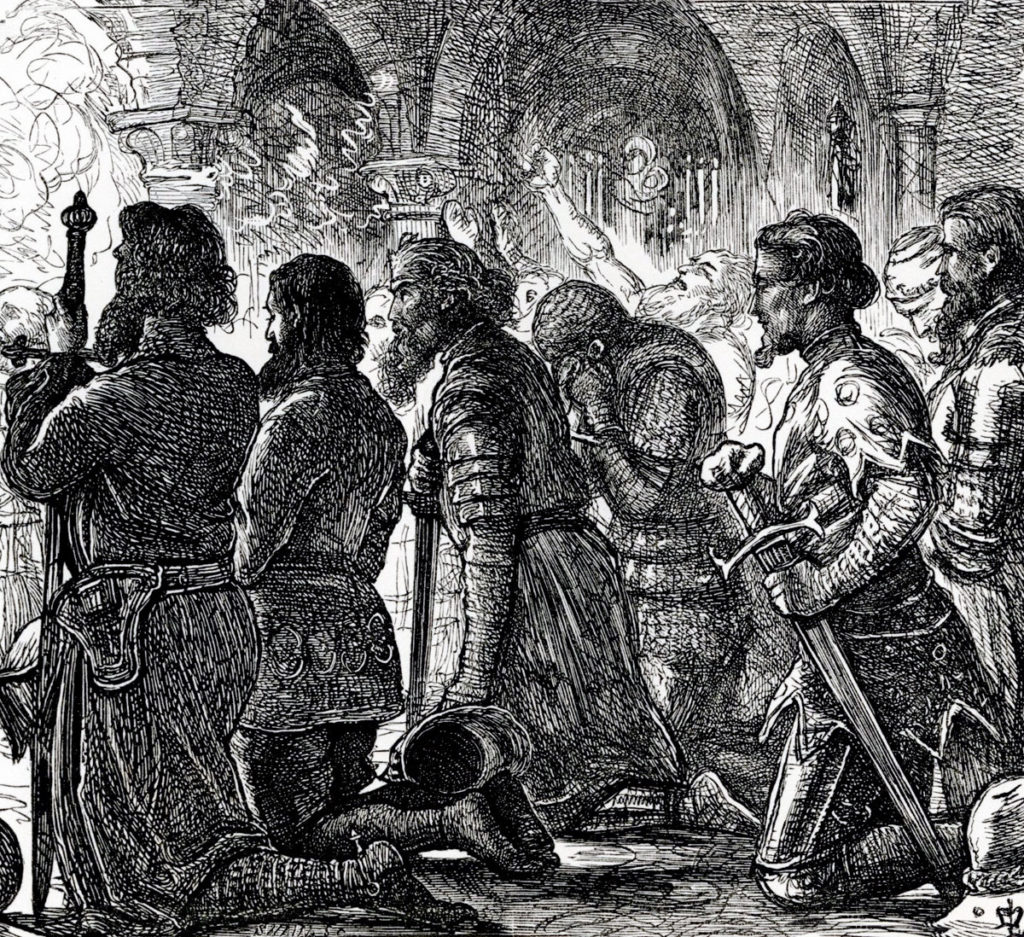
After a disjointed and badly aimed volley of arrows, the English archers of the right wing broke and fled into the trees, pursued by the Franco-Breton horsemen.
The main body of Franco-Breton dismounted men-at-arms climbed up the hill and drove Bentley’s weaker line of men-at-arms back against the tree line.
The Franco-Breton men-at-arms on the right were faced with a much steeper section of the hill which slowed their advance.
This allowed the English archers on Bentley’s left to maintain a discharge of arrows against the Franco-Bretons toiling up the hill, impeded by armour and heavy weapons.
These men were driven back down the hillside, enabling the English archers to attack the Franco-Breton centre in the flank.
The tide of battle began to turn against the dismounted men-at-arms of Nesle’s centre, who were forced back down the hill.
On the Anglo-Breton right wing many of the archers returned to the fight, preventing Hangest’s mounted men from coming to the relief of the hard-pressed centre of Nesle’s army.
Two large contingents of Franco-Breton men-at-arms fell back down the hill. One of these contingents was that of Jean de Beaumanoir, the hero of the battle of the Thirty.
Bentley’s men-at-arms pressed their attack and the whole Franco-Breton army was driven down the hill and off the battlefield in rout.
Jean de Nesle, the Constable of France, was killed during this rout.
Casualties at the Battle of Mauron:
Both sides suffered severe casualties in the battle.
Bentley was compelled to send to England for men to re-enforce the garrisons of Brittany that had suffered losses at Mauron from men sent to Bentley’s army.
The Franco-Breton losses were much worse, with the losses among the Bretons described as ‘catastrophic’.
When the victors counted the dead after the battle, they found 500 Franco-Breton men-at-arms, including Nesle, the Vicomte de Rohan, the most prominent nobleman of Brittany and a mass of Breton noble supporters of the house of Penthièvre/Blois.
Among the Franco-Breton dead were 89 knights of the French King John II’s new ‘Order of the Star’.
Follow-up to the Battle of Mauron:
The French defeat at the Battle of Mauron was in part the cause of the French King John II abandoning his attempt to replace John de Montfort as Duke of Brittany with his own candidate, Charles of Blois (himself a prisoner of the English in the Tower of London following his capture by Sir Thomas Dagworth at the Battle of la Roche-Derien in 1347).
King John II’s attention became focussed on the northern area of France around Calais where it was feared that King Edward III of England intended to launch an invasion of France.
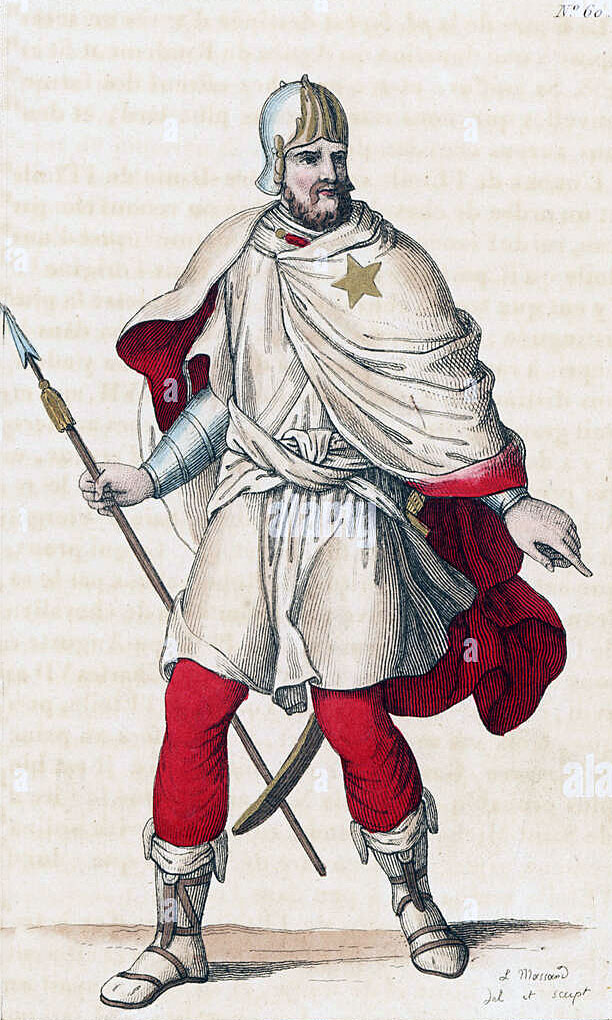
Anecdotes and Traditions from the Battle of Mauron:
- Following the Battle of Mauron, Sir Walter Bentley, the commander of the victorious Anglo-Breton army, had 30 of his archers who had fled from Hangest’s charge on the right wing of his army executed. This significantly increased his casualties from the battle.
- In November 1351, partly inspired by the English King Edward III’s newly created ‘Order of the Garter’, the French King John II formed his ‘Company of Knights of Notre-Dame de la Noble-Maison’ known as the ‘Order of the Star’. With 500 members, the order was intended to re-establish the morale and reputation of the French nobility. Members took an oath to fight for the French King until killed or captured, never retreating.
- The 89 members of the French King’s Order of the Star who died at the Battle of Mauron were killed on the hillside without retreating, in compliance with their oath.
References for the Battle of Mauron:
The Hundred Years War by Burne
Trial by Fire, Volume II of the four-volume record of the Hundred Years War by Jonathan Sumption
British Battles by Grant.
The Art of War in the Middle Ages Volume Two by Sir Charles Oman.
The previous battle of the Hundred Years War is the Battle of Winchelsea
The next battle of the Hundred Years War is the Battle of Poitiers
